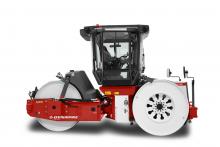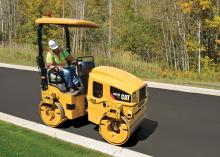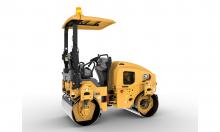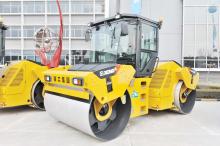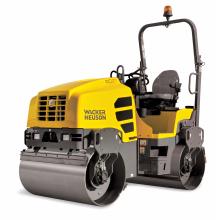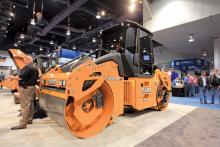New asphalt compaction machines are offering major gains in performance as firms develop new systems. Large and small asphalt compactors now offer higher output than earlier generation machines, while delivering better quality and lower fuel consumption as well as gains in reliability, durability, safety, ergonomics and operator comfort.
To suit rental customers, the machines have simple operating controls and analogue displays for fuel level, engine temperature, and machine hours. Starting is said to be easy due to the firm’s novel glow-plug technology. The machines are also said to be easy to transport, further suiting the units to the rental market. Single lifting points mean the compactors can be lifted on or off a truck or trailer easily, while the ROPS units are available with a folding design as an option to allow passage under low obstructions.
Diagnostic tools and easy access for servicing and maintenance helps minimise downtime and the machines benefit from Caterpillar’s Product Link capability. This allows fleet owners to remain informed of machine location and service needs. All of the units are powered by a Caterpillar C1.5 diesel delivering 22.3kW that meets the Tier 4 Interim/Stage IIIA/China Stage III emissions standards.
Dynapac’s compact CC1100 VI and CC1200 VI rollers are designed to be versatile, productive and easy to use. Suited to the rental market, these are 6th generation compactors that are able to cope with tough worksite conditions, according to the firm. The CC1100 has 1.1m wide drums while the CC1200 has 1.2m wide drums, with both models slotting into the weight class for machines between 3tonnes and 4tonnes.
The compactors are powered by
The diesels are mounted transversely, a layout intended to optimise engine access for maintenance. The combination of the transverse engine, sloping engine cover and relocation of the water tank to the rear chassis has helped improved forward visibility over the front drum.
The models are also available in combi-versions, with four static rubber tyres at the rear. Other features include an effective pressurised and filtered sprinkler system with an accessible pump and filter and automatic water control as standard. The spray bars have three nozzles on each drum while the sprinkler timer helps save water while the tanks hold 205litres. Lifting/tie down/towing points are built-in to the cast forks for easy transport, while a central lifting point is also available which makes the transportation between job sites easier. The machine has a foldable ROPS and a total length (including ROPS) of 2.4m. An optional canopy is offered that is foldable for easy transportation. Other options include ROPS-mounted, LED working lights for night work.
A new innovation from
Power comes from a Deutz diesel rated at 111kW, which meets the China Stage III emissions requirements. For the moment this machine is only being offered for the Chinese market but it will be available for export in due course. It is not yet clear if a Tier 4 Final/Stage IV version will be available for sale in the US and Europe, but given its sophistication and XCMG’s increasing worldwide presence, this remains a possibility.

